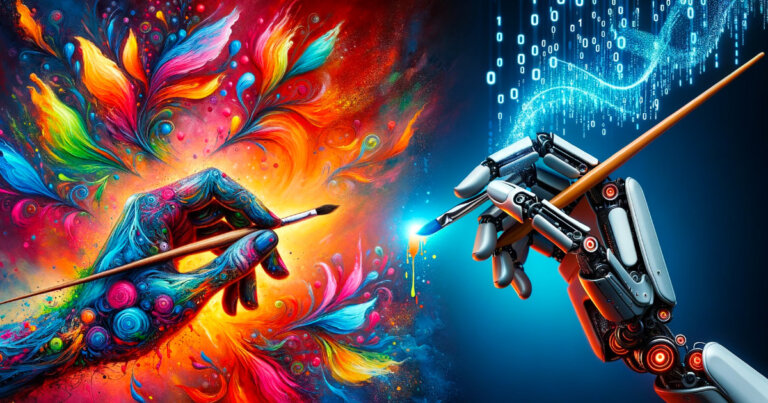 Op-ed: Seeding may be the critical difference between human and AI generated content
Op-ed: Seeding may be the critical difference between human and AI generated content Op-ed: Seeding may be the critical difference between human and AI generated content
Balancing human creativity and AI capabilities in idea generation is a skillset in its own right.

Cover art/illustration via CryptoSlate. Image includes combined content which may include AI-generated content.
As artificial intelligence continues to make strides in various industries, there is a growing debate about the capabilities of humans versus AI in creative endeavors.
A particularly pertinent question is: Who seeds ideas better—humans or AI?
This article explores the arguments for and against this theory before delving into the nuanced perspectives that blur the lines between the two.
The Theory: Humans are Better at Seeding Ideas
Human Experience
Human life is filled with experiences that shape our thoughts, ideas, and creativity. This rich tapestry of lived experiences provides an essential foundation for generating groundbreaking ideas. These experiences offer a source of creative inspiration, from the mundane to the life-changing.
Counterargument: However, human experiences can also limit our perspectives. Sometimes, a fresh, ‘naive’ analysis free from personal bias can generate revolutionary insights.
Emotional Intelligence
The role of emotional intelligence in seeding ideas is unquestionable. Emotions like empathy, joy, sorrow, and even anger can be the basis for profoundly resonant and relatable ideas.
Counterargument: Emotional experiences, while impactful, can also distort objective reasoning, leading to ideas or theories that may be flawed.
Social Context
Humans can read social cues and complex contexts, generating timely and relevant ideas. We understand societal norms, historical events, and cultural subtleties, often subconsciously incorporating them into our ideas.
Counterargument: Being too rooted in a particular social context can make us myopic, preventing us from considering alternative perspectives that may not conform to established social norms.
Original Thought
When humans engage in creative thinking, they often generate original ideas that stem from a unique blend of their experiences, knowledge, and imagination.
Counterargument: One could argue that all human thought is, to some extent, a recombination of existing ideas.
Ethical and Moral Framework
Humans can incorporate ethical considerations when generating new ideas, an ability currently beyond the reach of AI.
Counterargument: Ethics and morals are culturally and socially constructed. What one person considers ethically sound could be disputed by another from a different background.
The Counter-Theory: AI’s Capabilities in Seeding Ideas
Data-Driven Insights
AI can quickly analyze vast datasets, potentially identifying insights that might elude human analysis simply because of the processing speed and volume limitations.
Counterargument: AI can only work with the data it is given. Flawed or biased data will lead to flawed insights. However, socialized fact-checking and blockchain-secured datasets and oracles could potentially mitigate this issue.
Unbiased Analysis
AI could theoretically approach problems without human biases, possibly leading to novel insights.
Counterargument: Despite its potential for objectivity, AI can perpetuate human biases embedded in the data it was trained on. Additionally, a fully ‘neutral neutral’ AI, to coin a phrase from D&D, might even be dangerous.
Combinatorial Creativity
AI can combine existing information in novel and unexpected ways, potentially leading to new ideas.
Counterargument: Humans already engage in combinatorial creativity. Moreover, mere combinations of existing ideas might not amount to true innovation.
Collaboration with Humans
AI can augment human creativity, offering alternative viewpoints or approaches that might not have been considered otherwise.
Counterargument: While the concept of ‘understanding’ varies, if AI doesn’t truly ‘understand’ the problem, its suggestions could be irrelevant or misleading.
Non-linear Exploration
AI can explore multiple avenues simultaneously, generating a wide array of ideas in a short amount of time.
Counterargument: Quantity does not necessarily equate to quality. However, using a mix of serial and parallel processing with multiple instances of AI could enhance this capability.
So, is ‘seeding’ the key?
As we examine the arguments for both human and AI-driven imagination, it becomes evident that neither is definitively superior; instead, each has its strengths and weaknesses that could potentially complement the other.
The Co-Creation Paradigm
The concept of ‘co-creation’—the combined intellectual effort of humans and AI—poses a compelling alternative to the ‘either-or’ debate. AI can augment human thought processes by providing data-driven insights, unbiased analyses, and many ideas through non-linear exploration.
Humans, in turn, can imbue these ideas with emotional intelligence, ethical considerations, and societal context. For instance, AI’s data-driven insights and ability to explore multiple avenues simultaneously can be augmented by human emotional intelligence, ethical considerations, and a nuanced understanding of social context. This suggests that the most productive approach might be collaborative, where humans and AI work together in a co-creative process.
Another interesting dimension is the ethical interplay in a human-AI collaboration. While humans can guide AI to adopt a socially responsible framework, AI can help humans overcome cultural or personal biases.
This mutual guidance could lead to more comprehensive ethical considerations when seeding new ideas. Moreover, the concept of ‘meta-ideas’—ideas about ideating—presents an intriguing realm where human and AI capabilities could jointly create new methodologies for idea generation, transcending the limitations of either entity.
Looking to the future, the roles humans and AI play in ideation may become increasingly fluid. AI might develop a more nuanced understanding of emotional and ethical complexities, while humans could become more adept at leveraging AI’s strengths.
In essence, the debate shouldn’t focus solely on who seeds ideas better but should instead explore how the combined capabilities of humans and AI can enrich the ideation process. The most fertile ground for idea generation may be one where human creativity and AI capabilities are seamlessly integrated.




 CryptoQuant
CryptoQuant 













































































